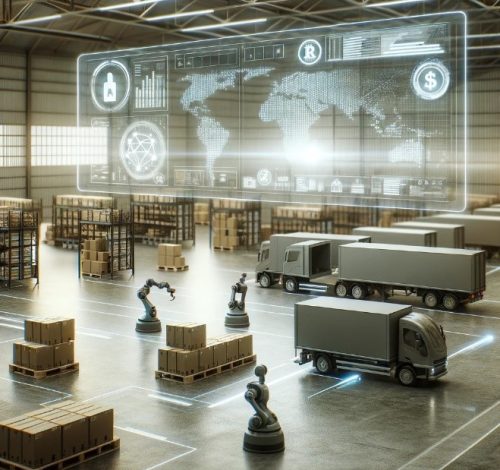The future of e-commerce logistics

Introduction 
Logistics is often considered the backbone of any e-commerce business. As consumer demand evolves and technologies advance, companies must adapt to remain competitive. The advent of Artificial Intelligence (AI), Blockchain, robotics, and innovations in delivery, among others, are opening up numerous exciting opportunities for the future of e-commerce logistics. In this article, we will explore these trends and share strategies to prepare your business for this logistical revolution.
Artificial Intelligence enhancing logistics
Artificial Intelligence (AI) has revolutionized logistics by enabling smarter and more efficient operations. This transformation occurs mainly at two levels: demand forecasting and delivery route optimization.
For demand forecasting, AI allows companies to predict consumer demand and adjust inventory levels in real-time. This approach directly impacts storage costs and reduces both surplus and stockouts.
Regarding delivery route optimization, sophisticated algorithms analyze vast amounts of data in real-time to identify the best routes based on various criteria, such as minimum cost, shortest distance, fastest route, maximum deliveries per trip, or lowest environmental impact. Depending on the chosen criteria, this can lead to reduced operational costs, shorter delivery times, or a lower ecological footprint.
Blockchain: transparency and security in the supply chain
Blockchain technology offers unprecedented transparency and security in the supply chain. By recording transactions in an immutable and transparent manner, it allows for the traceability of every step in the process, from production to order delivery. This transparency has a dual benefit: it enhances consumer trust and reduces the risks of loss, fraud, or counterfeiting. The immutability of data is also crucial; companies gain full and reliable visibility over all product flows throughout their journey, resulting in simplified and efficient supply chain management.
Robotics and Automation
Robotics and automation are revolutionizing warehouses by enhancing efficiency and reducing errors. Autonomous robots equipped with advanced sensors navigate warehouses, accurately and quickly collecting and moving goods. This automation complements rather than replaces human labor. Robots work alongside employees to expedite order fulfillment, thereby reducing processing times and enhancing the overall efficiency of the business. Concrete examples of where robotics and automation are applied in logistics include order picking, packaging and conditioning, load lifting, pallet wrapping, automated stock tracking, etc.
While robots drive operational efficiency, they also aim to safeguard human workers by mitigating the risks associated with poor working postures, heavy lifting, and repetitive tasks that can harm the health of logistics operators.
Last-mile delivery
Last-mile delivery represents one of the biggest challenges in urban logistics. To tackle this, companies are investing in innovative solutions such as drones and autonomous vehicles. This approach enables faster and more cost-effective deliveries while also reducing the carbon footprint of delivery operations.
The importance of logistics providers
Mastering the various points mentioned above is essential for an e-commerce business aiming to excel and stay at the forefront of logistics. However, this mastery requires significant investment, both financially and in terms of human resources.
This is where a partnership with a logistics provider becomes crucial. By contracting with a provider, you outsource your supply chain to true experts whose core business is to offer the best logistics solutions currently available on the market.
At Futurlog, we have particularly focused on AI and last-mile logistics. For example, our AI, named “Best Price“, calculates and selects the most cost-effective logistics and transport solution for a given order based on its weight, size, and delivery destination. And this is just the beginning; we plan to leverage AI at multiple levels within our procedures and services to continue offering the most competitive and high-quality outsourcing service in the French market.
Conclusion 
The logistics of tomorrow presents unprecedented opportunities for e-commerce businesses but also requires rapid adaptation to new technologies and the ever-changing demands of a more “hard to please” customer base. By investing in artificial intelligence, blockchain, robotics and automation, as well as innovative last-mile delivery solutions, your company can enhance its competitiveness and efficiency while providing an exceptional customer experience. Logistics is no longer confined to inventory management and deliveries; it has become a crucial differentiator for e-commerce companies. By embracing future technologies today, you can position your business to thrive in the era of logistical innovation.
 Feel free to share:
Feel free to share: 
